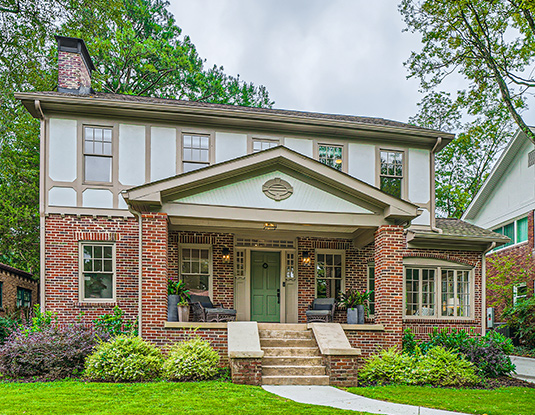
Emory / Druid Hills
Druid Hills is a distinguished suburban enclave located to the northeast of Atlanta, conceived in the late 19th century by notable developer Joel Hurt. The neighborhood’s masterful design was the work of renowned landscape architect Frederick Law Olmsted, best known for his contributions to New York’s Central Park and the grounds of the U.S. Capitol. Developed in the early 20th century with the backing of several prominentAtlanta families, Druid Hills was envisioned as an ideal suburban retreat—characterized by stately residences on expansive lots, mature tree canopies, and an abundance of green space.
The neighborhood is particularly notable for its four historic districts, which are gracefully bordered by the lush expanse of Olmsted Linear Park. The architectural character of Druid Hills reflects a refined blend of historical styles, including Georgian, Jacobean, Italian Renaissance, Tudor, and Victorian. Its proximity toEmory University contributes to a diverse housing landscape, with a variety of condominiums and apartment communities that offer upscale amenities such as private swimming pools and clubhouses.
Druid Hills’ location near Emory University and its affiliated hospital means a significant portion of its residents are connected to the institution. This established neighborhood is celebrated for its picturesque charm and long-term residents, fostering a strong sense of community. NearbyEmory Village provides convenient access to an array of dining, shopping, and essential services.
The crown jewel of the neighborhood’s green spaces is Olmsted Linear Park, a 50-acre expanse that stretches along Ponce de Leon Avenue. This beautifully landscaped corridor features walking trails and pastoral settings, including Deepdene —a 20-acre wooded preserve with rolling slopes, meadows, and a serene stream. The park’s natural beauty is highlighted annually at the Olmsted Plein Air Invitational, where artists from across the region gather to paint landscapes inspired by the park and its surroundings.
Emory University, consistently recognized among the world’s premier research institutions, serves as both an academic and recreational hub. Its campus includes Lullwater Preserve, a scenic haven for walkers and runners. The Lullwater Trail weaves past the historic Lullwater House, along the banks of Candler Lake, and over a suspension bridge that leads toa picturesque mill and waterfall nestled within a biodiverse forest.
On the eastern edge of the neighborhood lies the Fernbank Museum of Natural History, home to engaging permanent and rotating exhibits, as well as immersive, hands-on displays for children. Adjacent to the museum is Fernbank Forest, a 65-acre old-growth woodland with towering trees that reach up to 16 stories, offering more than two miles of tranquil trails.
For those seeking recreational and social opportunities, theDruid Hills Golf Club provides an elegant setting. Established in 1912 and redesigned by Bob Cupp in 2003, the club features an 18-hole championship course. The venue hosts prestigious events such as qualifying rounds for the U.S. Women’s Open and the nationally ranked Dogwood Invitational, a top-tier amateur men’s golf tournament. Additional club amenities include farm-to-table dining experiences, a modern fitness facility, 11 tennis courts, and an aquatics center complete with three pools.
This content is currently unavailable. Please check back later or contact the site's support team for more information.

